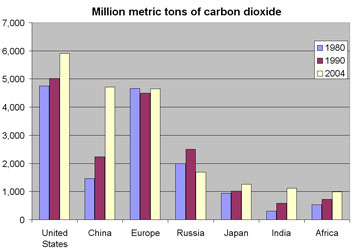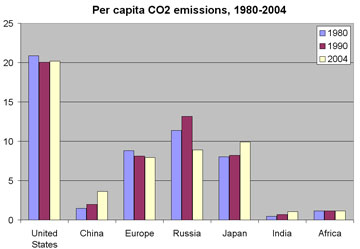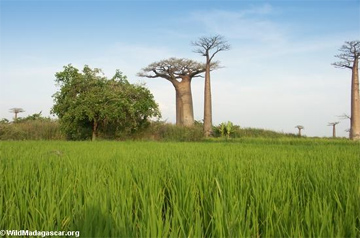Africa proposes its own solution to global warming
Rhett A. Butler, mongabay.com
December 10, 2008
African coalition calls for “full-range” of biocarbon as climate solution
|
|
A coalition of 26 African countries is calling for the inclusion of carbon credits generated through afforestation, reforestation, agroforestry, reduced soil tillage, and sustainable agricultural practices in future climate agreements.
The African Climate Solution — a partnership launched at the current climate talks in Poznan, Poland — seeks payments from industrialized nations for efforts by developing countries to sequester carbon through land use practices. The initiative goes beyond the proposed reducing emissions from deforestation and degradation (REDD) mechanism that is currently under debate at the Poznan conference.
 
|
Land use — including deforestation, habitat degradation, and agriculture — accounts for roughly thirty percent of anthropogenic greenhouse gas emissions in some years, an amount exceeding that from the global transportation sector. While Africa is the smallest emitter of greenhouse gases outside of Antarctica — yet stands to bear the brunt of climate change — the coalition is hoping to capitalize on the capacity of the continent’s ecosystems to store massive amounts of carbon through reduced deforestation, reforestation, low-impact farming methods and restoration of soil carbon through processes like biochar. But the coalition is not limiting participation to African nations — it seeks to include other developing countries.
“This initiative is African in origin but is intended to include all developing nations,” said Mr. Sindiso Ngwenya, Secretary General of the Common Market for Eastern and Southern Africa (COMESA) who gave a key note presentation at the launch of the Africa Climate Solution. “We all face the same problem of dealing with climate change and sustainable development. We are seeking the support of countries in Asia, Latin America and Small Island States to ensure that not only Africa’s voice but that of the world’s poor and excluded will be heard loud and clear in articulating solutions for mitigation and adaptation measures on climate change.”
Pushing for the inclusion of a “full-range” of bio-carbon in a post-2012 climate treaty
Largely excluded to date from mechanisms that compensate countries for reducing emissions, the African Climate Solution is calling for “the expansion of eligibility of resources beyond REDD to include the full range of bio-carbon in the climate change negotiations.” The group believes that financial incentives for mitigating climate change can simultaneously lift some of the world’s poorest out of poverty.

|
“We are saying the carbon markets must reward our resource-poor farmers for contributing to efforts towards mitigating the effects of climate change,” said Dr. Lindiwe Majele Sibanda, CEO of the Food, Agriculture and Natural Resources Policy Analysis Network (FANRPAN), based in South Africa.
“Africa has spoken with one voice on its readiness to join hands with the international community in securing a cleaner and sustainable planet for current and future generations. The time for that action is now.”
The initiative — which calls itself “a REDD-Agriculture, Forestry and Sustainable Land Use (AFOLU) Bio-carbon Coalition” — has developed a framework for the creation of an African Fund that would “provide a sustainable carbon financing mechanism suitable for investments sustainable agriculture and agroforestry projects in Africa.”
Related articles
New plan would pay tropical countries for protecting terrestrial carbon, regardless of where it is stored
July 24, 2008
Deforestation and forest degradation account for around a fifth of global carbon emissions from human activities, but new policy measures are focusing reducing such emissions as a cost-effective way to fight global warming. While the concept — known as REDD for “Reducing Emissions from Deforestation and Degradation” — has found wide support from politicians, scientists, and environmentalists, there are lingering concerns over how to compensate countries that have extensive forest cover and low rates of annual forest loss, since payments are based on historical deforestation rates. A new proposal seeks to get around this issue by factoring in all the terrestrial carbon in a tropical landscape — regardless of where it is stored and packaging it as a tradable commodity. The concept is presented in a paper by the Terrestrial Carbon Group, a group of scientists, economists and public policy experts. The paper, “How to Include Terrestrial Carbon in Developing Nations in the Overall Climate Change Solution”, lays out a series of “guiding principles” for action to address emissions from terrestrial carbon sources.
Organic farming could break cycle of famine and poverty in Africa October 22, 2008
Organic farming may offer Africa the best opportunity to break out of the devastating cycle of poverty and malnutrition parts of the continent have faced in recent decades, according to a new report from the United Nations.